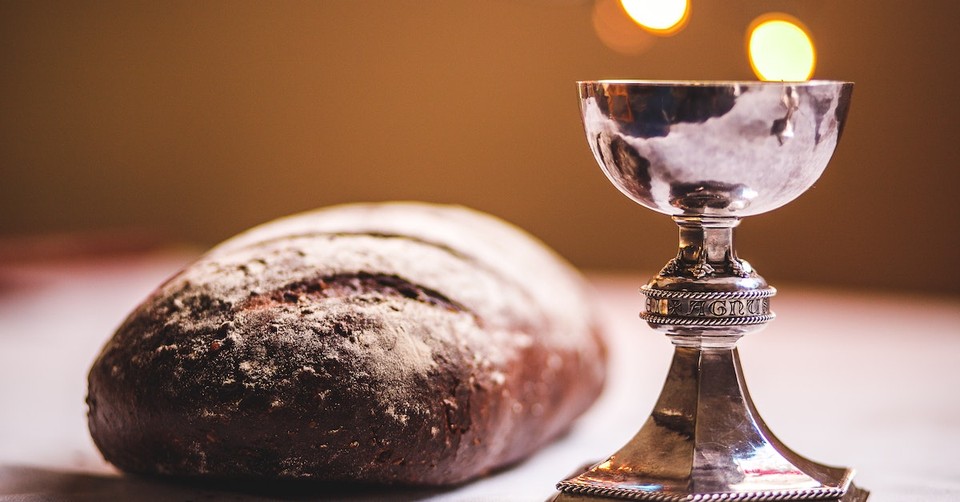4 Reasons Why the Eucharist Is Not Just Symbolic

The Eucharist is a reenactment of the supper Jesus shared with his disciples prior to his betrayal. Bread and wine were served, as these were the typical elements of the Passover celebration. Amid this traditional feast, however, Jesus infuses the bread and wine with new meaning. Jesus refers to the bread as “my body, given for you”, and the wine as “a new covenant in my blood” (Luke 22:19-20). The bread and wine represent Christ’s bodily sacrifice on the cross and the effect that it will have on the spiritual lives of all believers. The Christian community has celebrated this feast ever since.
Many questions surround the celebration of the Eucharist. Is Jesus really present in the bread and wine? Is the Eucharist just a symbolic act? Should we use wine or grape juice? Should we celebrate the Eucharist every day, every week, every month, or only a few times per year?
The fact that we ponder such questions testifies to the centrality of the Eucharist to Christian life. In fact, many Christian denominations consider the Eucharist to be the highest act of worship. This suggests that the Eucharist is not simply a memorial act, but a power-filled rite through which we are united to the risen Lord. Below are four reasons we can be confident in Christ’s presence in the Eucharist.
1. Jesus Commands the Eucharist
The Last Supper was not just a final meal. Jesus institutes a rite whereby Christians live out their faithful communion to their Lord. This means that the Eucharist is not an optional discipline for the Christian person. Christ specifically calls his followers to “do this in remembrance of me” (Luke 22:19). The act of remembering, in this context, does not mean we merely think of a fond memory, a memory we are in danger of forgetting; Rather, “to remember” is to receive the truth of the Eucharist as a present reality. We remember Jesus in the bread and wine the same way Christ remembers us in his Kingdom (Luke 23:42). This is the heart of Christ’s command.
This frequent celebration of the Eucharist was central to the early church. The early church took the command to “do this in remembrance of me” literally. The book of Acts describes the apostles as devoted to “the breaking of the bread” (Acts 2:42). This devotion became a point of controversy for the early church. Early objections to Christianity labeled the followers of Jesus as cannibals. This criticism was based on the language of “eating flesh and drinking blood.” This charge of cannibalism opened the Christians of the day to rejection, ridicule, and persecution. Despite this, the Christian community maintained this practice out of obedience to Christ’s word.
When Christians partake of the Eucharist, they participate in a rite that has governed the worship of the church since its inception. In receiving the bread and wine, Christians express their allegiance to Jesus as Lord and Savior. Furthermore, the Eucharist testifies that Jesus died for our sins and was raised for our justification. Obedience to Jesus, therefore, necessitates continual participation in the Eucharist.
2. The Eucharist Is a Power-Filled Rite
The centrality of the Eucharist is not to be taken lightly. The Eucharist is so important to the Christian life that Scripture warns us against “eating the bread and drinking the cup in an unworthy manner” (1 Corinthians 11:27). For the early church, the way a Christian participated in the Eucharist had spiritual, and eternal, implications. If one did not “recognize the body of the Lord” in the Eucharist (1 Corinthians 11:29), one unwittingly brought condemnation upon themselves. Paul even equates weakness, sickness, and death as results of unfaithful participation in the Eucharist (1 Corinthians 11:30). This is a serious charge.
Do we have such a view of the Eucharist today? Do we believe that partaking in the Eucharist can transform our spiritual lives? Or do we see the Eucharist as an act of simple nostalgia? As followers of Jesus, we are called to recognize the body of Christ in our Eucharistic participation. Ultimately, if the Eucharist is so serious that Scripture warns against its misuse, then we out to examine our practice of Eucharistic participation lest we eat and drink unworthily.
3. Yes, Jesus Is present at the Eucharist!
The Eucharist is not an act of empty religiosity. The risen Jesus is present in the celebration of the Eucharist. While Christians may argue as to how this takes place (i.e., physically, or spiritually), Scripture teaches that the Eucharist draws us near to Jesus.
Jesus himself taught this understanding. Jesus refers to himself as the “living bread that came down from heaven,” stating “whoever eats this bread will live forever; this bread is my flesh which I will give for the life of the world” (John 6:51). Here, Jesus links the future celebration of the Eucharist to the reception of his body. Jesus goes on to state that “whoever eats my flesh and drinks my blood remains in me and I in them” (vs. 55). To partake in the Eucharist is to abide in fellowship with the risen Lord.
This is the predominant understanding of the Eucharist throughout church history A recent sermon by noted pastor and author Francis Chan addressed this very fact. Reflecting on his own misunderstanding of the Eucharist, Chan confesses “I didn’t know that for the first 1500 years of church history, everyone saw [the Eucharist] as the literal body and blood of Christ; it wasn’t till 500 years ago that someone popularized a thought that it’s just a symbol and nothing more. I didn’t know that” (watch the sermon here). While there is historical variation as to whether the bread and wine transform into flesh and blood (i.e., transubstantiation vs. real presence), the church has historically believed that Christ is fully present at the Eucharist.
Ultimately, this means that in receiving the bread and wine, the believer receives the presence of Christ – alive and active in their midst. In the bread and wine, we are fed by the life of Jesus and the blessings of his resurrection. Paul writes “is not the bread we break a participation in the body of Christ?” (1 Corinthians 10:16). The risen Lord is met when we eat of the bread and drink of the cup.
4. The Eucharist Is a Foretaste of the Kingdom
If the Eucharist is simply a memorial of Christ’s death, then it is but a looking back at Christ’s final meal. It is an act of remembrance, a rite in the past tense. This is not how the disciples, nor the early church, understood the Eucharist. Rather than looking back, the Eucharist pointed forward. Partaking in the Eucharist speaks to a belief in the Lord’s second coming. Paul writes that “for whenever you eat this bread and drink this cup, you proclaim the Lord’s death until he comes” (1 Corinthians 11:26). We proclaim Christ’s death only because we affirm his resurrection and await his second coming. The Eucharist, therefore, is an act of faith in the resurrection, Christ’s and our own. By casting our minds forward the Eucharist speaks to our hope in eternal life.
Eternal life, however, is not merely what happens to us when we die. Partaking in the Eucharist is a way of expressing the hope of the gospel in the context of life here and now. The Eucharist becomes a tangible expression of the very redemption we participate in. In this way, the Eucharist is a foretaste of that heavenly banquet. It is a tangible picture of the “marriage supper of the lamb” (Revelation 19:9). When the follower of Jesus takes the bread and wine, they do not simply look back to Jesus’ last meal with the disciples. Taking the Eucharist is a radical act of faith by which one looks forward to, and participates in, the kingdom of God.
In Conclusion, the Eucharist Is a Place Where We Meet Jesus
This lies at the heart of the celebration. This was how the disciples, the apostles, and the early Christians saw this important feast. In those times when we feel lost or confused, or besieged by our own waywardness, the Eucharist becomes a place of reunification with our Lord. We can approach the Eucharistic feast with confidence and assurance, knowing that as we eat the bread and drink the wine, we draw closer to our Savior.
If you are feeling like you need to reconnect with Jesus, then consider partaking in the Eucharist. Simply call up your local church and arrange to receive the sacrament. If your church does not celebrate communion regularly on Sundays, then ask for the Eucharist to be brought to you in your home (yes this is allowed!). The Eucharist unites us to Jesus in a profound way. As one of the principal rites of the Church, the Eucharist is the primary place to go when we feel in need of spiritual sustenance.
Photo credit: Unsplash.com/James Coleman

Originally published April 06, 2022.





